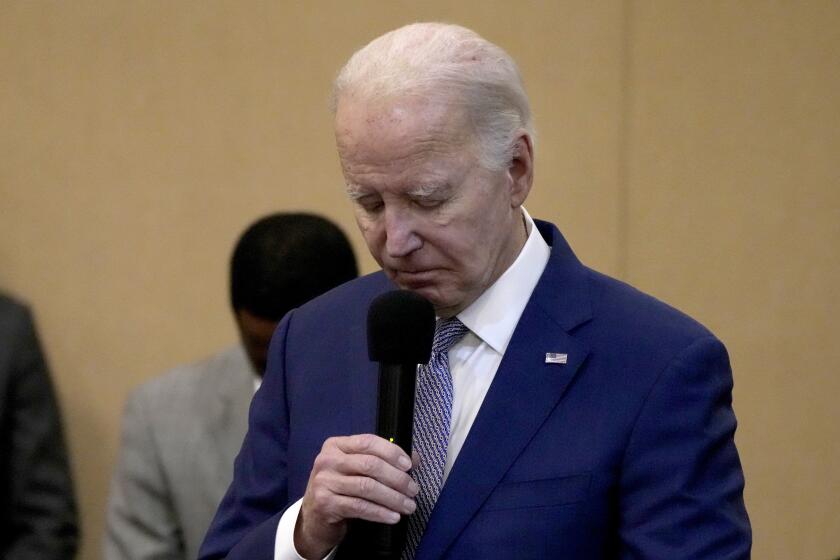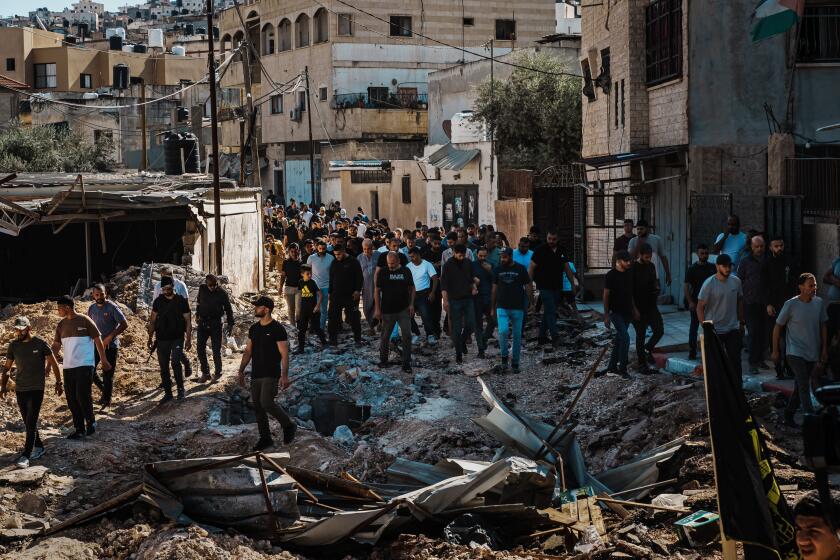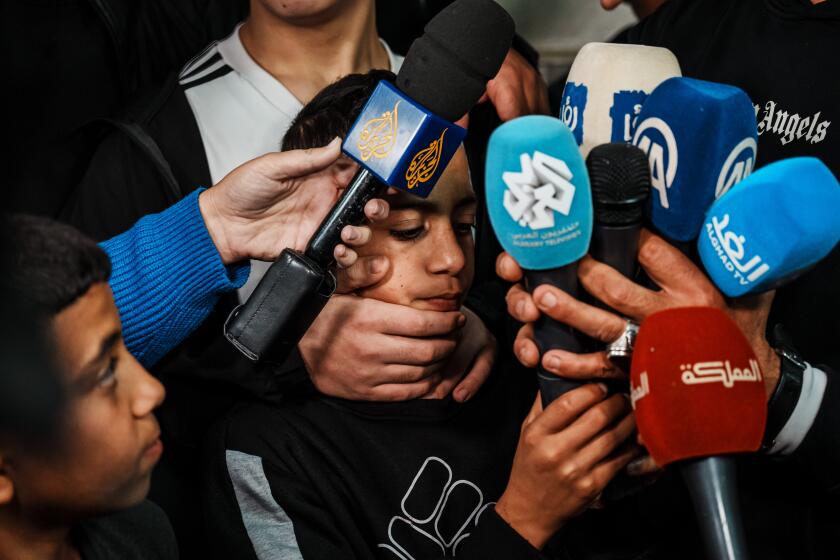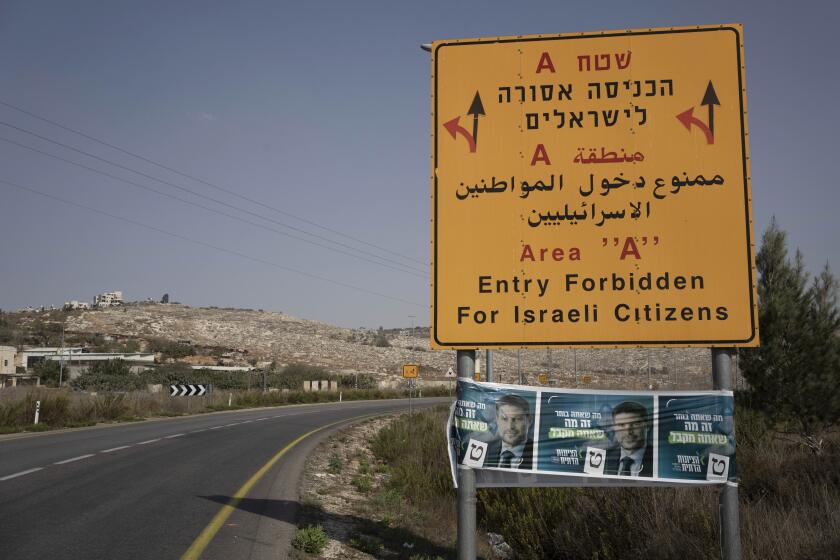Israeli undercover forces dressed as women and medics storm West Bank hospital, killing 3
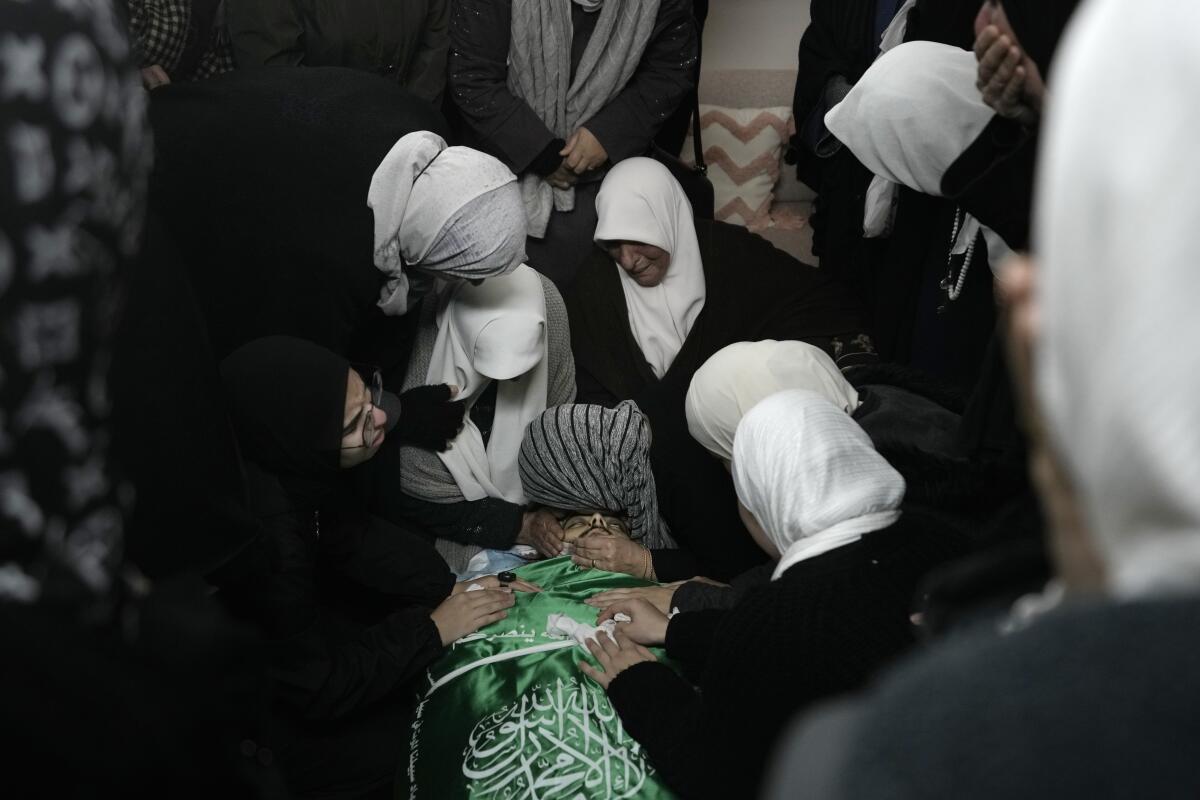
- Share via
JENIN, West Bank — Armed Israeli forces disguised as women and medical workers stormed a hospital Tuesday in the occupied West Bank, killing three Palestinian militants in a dramatic raid that underscored the spillover of deadly violence to the territory during the war in Gaza.
The Palestinian Health Ministry said Israeli forces opened fire inside the wards of the Ibn Sina Hospital in the town of Jenin. The ministry condemned the raid and called on the international community to pressure Israel’s military to halt such operations in hospitals. A hospital spokesperson said there was no exchange of fire, indicating that it was a targeted killing.
The military said the militants were using the hospital as a hideout. It alleged that one of those targeted in the raid had transferred weapons and ammunition to others for a planned attack, purportedly inspired by the Hamas assault on southern Israel on Oct. 7. The military did not provide evidence backing that claim.
Video said to be from a hospital security camera that circulated on social media showed about a dozen undercover forces, most of them armed, dressed as women with Muslim headscarves or hospital staff in scrubs or white doctor’s coats. One in a surgical mask carried a rifle in one arm and a folded wheelchair in the other. The forces were seen patting down one man who knelt against a wall, his arms raised.
Israeli Prime Minister Benjamin Netanyahu, meanwhile, denied reports of a possible cease-fire deal to end the war in Gaza during an event in the occupied West Bank on Tuesday, repeating his vow to keep fighting until “absolute victory” over Hamas.
“We will not end this war without achieving all of our goals,” he said. “We will not withdraw the Israeli military from the Gaza Strip, and we will not release thousands of terrorists,” he said, referring to Hamas’ main demands.
The deadly drone attack in Jordan is threatening to upend the Biden administration’s delicate effort to prevent the Israel-Hamas war from spiraling into a broader regional conflict.
The war began when hundreds of Hamas-led militants stormed into Israel, killing about 1,200 people, mostly civilians, and abducting about 250 others. More than 100 were released during a weeklong cease-fire in November in exchange for Palestinians imprisoned by Israel.
In response, Israel launched a blistering air, sea and ground offensive that has killed more than 26,700 people in Gaza, according to the Health Ministry in Hamas-run Gaza. The ministry count does not distinguish between fighters and noncombatants, but it says about two-thirds of the dead are women and children.
The conflict has also leveled vast swaths of the tiny coastal enclave, displaced 85% of its population and pushed a quarter of residents toward starvation. That humanitarian crisis may soon be exacerbated, the U.N. has warned, after several countries froze funding to the main aid provider to Palestinians in Gaza following Israeli claims that a dozen of its workers participated in the Oct. 7 assault.
Israel has come under heavy criticism for its raids on hospitals in Gaza, which have treated the tens of thousands of Palestinians wounded in the war as well as providing critical shelter for displaced people.
Gaza’s healthcare system, which was already feeble before the war, has been on the verge of collapse, buckling under the scores of patients, the lack of fuel and medical necessities limited by Israeli restrictions and repeated interruptions from fighting in and near the facilities.
Palestinians in Jenin refugee camp, a center of West Bank resistance, say repeated Israeli raids appear intended to make their city as uninhabitable as Gaza.
Israel says militants use hospitals, especially in Gaza, as hideouts or bases from which to launch operations. The military has found underground tunnels in the vicinity of hospitals, and says it has located weapons and vehicles used in the Oct. 7 attack on hospital grounds.
Since Oct. 7, violence in the West Bank has also surged as Israel has cracked down on suspected militants, killing more than 380 Palestinians, according to the Palestinian Health Ministry. Most were killed in confrontations with Israeli forces during arrest raids or violent protests.
The Israeli military says it has arrested nearly 3,000 Palestinians in the West Bank over the last four months.
The military said Tuesday that forces killed Mohammed Jalamneh, 27, who it said was planning an imminent attack. The two other men killed, brothers Basel and Mohammed Ghazawi, were hiding inside the hospital and were involved in attacks, the military claimed.
The military did not provide details on how the three were killed. Its statement said Jalamneh was armed with a pistol, but made no mention of an exchange of fire.
The recent hostage-for-prisoner swaps between Hamas and Israel have focused attention on the number of Palestinian minors imprisoned by Israel.
Hamas claimed the three men as members, calling the operation “a cowardly assassination.”
Hospital spokesperson Tawfiq al-Shobaki said that there was no exchange of fire and that the three were killed by Israeli forces in a targeted killing. He said the Israelis attacked doctors, nurses and hospital security during the raid.
“What happened is a precedent,” he said. “There was never an assassination inside a hospital. There were arrests and assaults, but not an assassination.”
He said Basel Ghazawi had been a patient in the hospital since October with hemiplegia, or partial paralysis.
The raid took place in Jenin, long a bastion of armed struggle against Israel, where the internationally backed Palestinian Authority and its security forces have little of a foothold. The city had been the frequent target of Israeli raids even before the war began. Israeli operations there and in an adjacent built-up refugee camp have left vast amounts of destruction.
News Alerts
Get breaking news, investigations, analysis and more signature journalism from the Los Angeles Times in your inbox.
You may occasionally receive promotional content from the Los Angeles Times.
Israel occupied the West Bank, along with the Gaza Strip and East Jerusalem, after the 1967 Mideast War. More than half a million Israelis now live in settlements in the West Bank.
Israel withdrew troops and settlers from Gaza in 2005, but imposed a stifling blockade on the territory, along with Egypt, when Hamas came to power in a violent takeover in 2007.
The Palestinians claim those territories as part of their future independent state, hopes for which have increasingly dimmed since the war began.
Progress, meanwhile, appeared elusive on a new deal between Israel and Hamas that could lead to a pause in fighting and see the release of dozens of hostages still held in Gaza.
Prime Minister Benjamin Netanyahu’s ultranationalist government has quietly taken steps toward cementing Israel’s control of the occupied West Bank.
On Tuesday, Hamas’ supreme political leader, Ismail Haniyeh, said the group was studying the latest terms for a deal, but said that the priority was the “full withdrawal” of Israeli forces from Gaza, something Israel opposes, and that any agreement should lead to a long-term cease-fire.
He said Hamas’ leadership had been invited to Cairo to continue talks.
Israel had said that cease-fire talks held Sunday were constructive but that “significant gaps” remained in agreements proposed so far.
The prime minister of Qatar, which has served as a key mediator with Hamas, was more upbeat, saying U.S. and Mideast mediators had reached a framework proposal for a cease-fire and hostage release to present to the militant group. Speaking at the Atlantic Council in Washington, Sheikh Mohammed bin Abdulrahman Al Thani said the mediators had made “good progress.”
The Israeli military said it was fighting Palestinian militants in south, central and northern Gaza, which was pummeled in the first weeks of the war and where Israel has claimed to have largely dismantled Hamas. It said aircraft destroyed the rocket launcher that fired a barrage of rockets at central Israel on Monday, the first rockets targeting the populated area in weeks.
More to Read
Sign up for Essential California
The most important California stories and recommendations in your inbox every morning.
You may occasionally receive promotional content from the Los Angeles Times.
